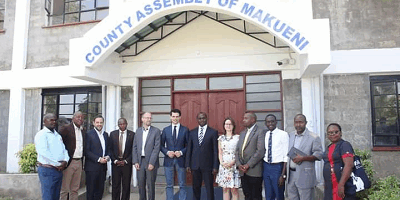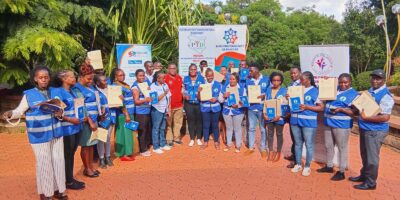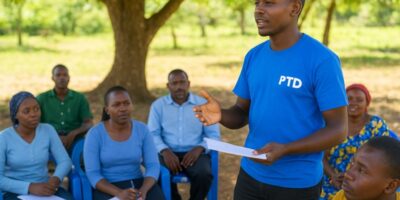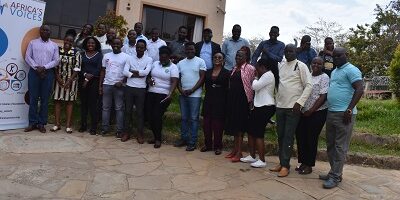Africa’s Voices Foundation, in collaboration with Partnership for Transformational Development (PTD) Kenya and other Civil Society Organizations (CSOs) from across Makueni County, convened a powerful cultural dialogue session at Kilimani Breeze Hotel, Wote. The interactive forum focused on exploring and documenting the rich heritage of the Kamba people — tracing their origins, governance systems, conflict resolution methods, and the deeply rooted moral and ethical codes that guided traditional Kamba society.
Understanding the Roots of the Kamba People
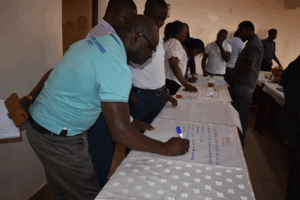
Participants reflected on the origin of the Kamba community, tracing their migration, settlement patterns, and the development of traditional governance structures that ensured unity, discipline, and mutual respect. The discussion delved into how clans such as Atangwa, Aombe, Asii, Amutei, and Akitondo among others, governed themselves and resolved disputes through well-structured clan councils (atumia ma ithembo). These councils, often composed of wise elders, played a critical role in upholding justice, mediating conflicts, and maintaining harmony among families and clans.
Traditional Oaths and Integrity
A key highlight of the conversation was how oaths and traditional rituals were used to enforce honesty and accountability. The elders administered oaths (muma) not as acts of fear, but as social contracts binding individuals to truth and integrity. This indigenous approach to governance ensured that moral conduct, transparency, and ethical leadership were deeply ingrained within the community. Participants noted that while modern systems rely on legal frameworks, traditional Kamba society relied on cultural and moral authority to guide behavior — a value system that today’s governance structures can learn from.
Documenting the Rich Kamba History
One of the central outcomes of the session was the commitment to document Kamba history and governance practices for future generations. Participants observed that a large portion of this rich knowledge is passed orally and risks being lost if not recorded. Through collaborative efforts between Africa’s Voices Foundation, PTD Kenya, and local cultural scholars, the meeting resolved to initiate a community-led documentation project to preserve oral histories, governance systems, and indigenous moral practices that can inform modern governance and civic engagement.
Community Volunteerism: Lessons from the Past
Discussions also focused on the spirit of volunteerism and collective community work that characterized the lives of our forefathers. In traditional Kamba society, communal labor (mwethya) brought people together to build schools, roads, water points, and other public utilities without expecting payment. The elders compared this strong culture of self-help and participation with the attitudes of Millennials and Gen Z, noting that the younger generations often rely heavily on government or donor support. The participants agreed that reviving this culture of shared responsibility and ownership is essential for the success of devolved governance.
From Tradition to Devolution

The forum explored practical ways of integrating these traditional values into the current devolution framework. Participants emphasized that true devolution must begin with mindset change — where citizens see public projects as their own, not just government initiatives. By instilling values of unity, accountability, and shared responsibility drawn from Kamba culture, citizens can better participate in planning, implementing, and sustaining local development projects.
Leadership Insights and Case Study
During the dialogue, Ms. Nzilani, Head of Programs at Africa’s Voices Foundation, led the discussions, emphasizing the link between cultural identity, civic participation, and governance. She was joined by Communication Officer, Mr. Oscar Mudega, and Researcher, Ms. Mary Kasiva, who facilitated a knowledge-sharing session on how culture-based engagement can foster inclusive and participatory governance.
Adding a practical perspective, PTD Kenya’s Executive Director, Mr. Joseph Kioko, shared an inspiring case study from Unoa Comprehensive School. He narrated how, through collaboration with the Board of Management (BoM) and the Head of Institution, Ms. Winfred Sila, they successfully mobilized parents to construct a 12-door modern latrine block for the pupils — fully funded and built by the community. This initiative, he said, demonstrated how citizen participation and project ownership can lead to sustainable solutions even in the absence of external funding.
Mr. Kioko urged CSOs present to create awareness among citizens on supporting government projects throughout the entire project cycle — from design to monitoring — to foster accountability and a sense of belonging. He emphasized that when citizens are actively involved, projects last longer, serve their purpose, and strengthen trust between the people and government.
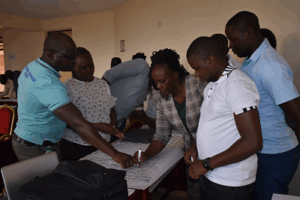
Conclusion
The session ended with a shared commitment among all stakeholders to revive, document, and integrate Kamba cultural values into civic education, governance, and development frameworks. Africa’s Voices Foundation and PTD Kenya reaffirmed their partnership in promoting citizen-led, culturally informed approaches to governance, ensuring that traditional wisdom continues to inspire integrity, unity, and active participation in Makueni County and beyond.

